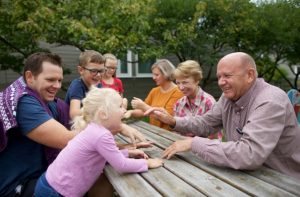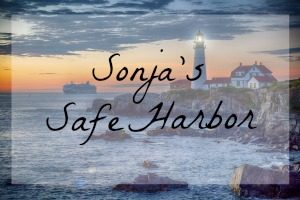Parents may think their job is to raise their children to be productive contributors to society. Truth is, raising children teaches you all the things you refused to learn when you were a child!
The gifts your children bring will either make you or break you. When you refuse to receive the gifts your children bring, they are destined to continue mirroring your life back to you. When that happens, they may never be released to discover their own unique gifts — or at least, until they one day choose whether or not to receive the gifts that their own children bring. And so it goes…
 I’ve heard the phrase “You can only teach what you know,” but I better understand the principle “You only teach what you want to learn.” What I didn’t realize is how important it is for the teacher to take a long look at what she is teaching. As a life coach, I learned that the coach doesn’t offer answers for their clients. The primary responsibility of a coach is to listen to their client and discover powerful questions they can ask that will provide an opportunity for the client to seek their own answers. It helps them learn the difference, as well as how to use healthy coping skills (and the damaging effects of “avoidance” coping skills).
I’ve heard the phrase “You can only teach what you know,” but I better understand the principle “You only teach what you want to learn.” What I didn’t realize is how important it is for the teacher to take a long look at what she is teaching. As a life coach, I learned that the coach doesn’t offer answers for their clients. The primary responsibility of a coach is to listen to their client and discover powerful questions they can ask that will provide an opportunity for the client to seek their own answers. It helps them learn the difference, as well as how to use healthy coping skills (and the damaging effects of “avoidance” coping skills).
As a life coach, I have developed a list of five questions that are typically part of the intake session with a new client. I ask them to journal their responses to these questions prior to our next session. These are simple questions and the answers can fill volumes:
- What is the issue?
- How’s that working for ya?
- How long do you want to feel that way?
- What are you willing to do differently?
- What do you absolutely refuse to do differently?
Questions are short—answers are complex. I’ve been asking others these questions for years, and yet apparently not asking myself.
I learned years ago that people are motivated largely by the question “What’s in it for me?” We persist in repeated behavior choices by whether or not the natural consequences of that behavior feed some deep need.
The definition of self-defeating is “some action or behavior that sabotages the thing that you are trying to accomplish.” Emotional pain or trauma are some of the most common reasons for people to engage in self–destructive behavior. The individual may use self–destructive behaviors as a form of punishment for a lack of control over themselves, their world, or their actions.
What my son has brought to my attention, as he has just recently become a grandfather, is that it isn’t okay to ignore the importance of family. It is our responsibility to take the necessary steps to strengthen it, to repair the broken pieces, to open our hearts to healing and forgiveness, and build the bonds of love and connection. Our family is the first focus of our eternal stewardship. It will take work. It may take time. It often is not easy.
It is true that I am learning more from my son than he learned from me. Perhaps in some ways, the learning has been reciprocal. What I do know is that I’m hopeful I’m viewing my family through a much brighter lens, and I am proud of the generational progress that is being made. It gives me hope that turning the son’s heart to the mother, and the mother’s heart to the son, really is possible. I have greater understanding of the return of the prodigal. This “ministry of reconciliation” is helping me continue to sift through the old inner dialogue tapes to discover where I need to reevaluate my life.
 I am so grateful for this wakeup call in my life. My son recently called me and asked, “Mom, what is it that you want?” The next thing he did was to challenge me to tell myself the same thing I would say to someone in my circumstances.
I am so grateful for this wakeup call in my life. My son recently called me and asked, “Mom, what is it that you want?” The next thing he did was to challenge me to tell myself the same thing I would say to someone in my circumstances.
What do I want? A family that is loving, happy, creates healthy relationships, values each other, and enjoys interacting.
What do I have? Little or no interaction with my sons or grandchildren, even though we live in relatively close proximity to each other.
- What’s in it for me to continue this reality?
- I get to continue punishing myself for the lack of skills I had, which was harmful to my children.
- I get to believe I don’t deserve to be wanted or loved by my children and grandchildren.
- I get to receive constant reminders that having a family will always elude me.
- I get to be invisible and lonely.
- I get to continue helping others learn and grow while exempting myself from applying my knowledge in my own life.
- I get to continue believing that I don’t need anything from anybody.
- I get to be the personification of a martyr and feel sorry for myself.
- I get to continue being the little girl lost that nobody can find, protect, or console.
- I get to drag this bag of rocks with me wherever I go, all the while teaching others to “let it go!” This reality further feeds my self-condemnation. It is a form of self-flagellation. Maybe a ritualistic form of penance for past sins? Or perhaps even an effort to get closer to God?
The mantra that accompanies every difficult situation is “Let it go—the past is intended to be learned from, not lived in.”
How would I be answering those questions I posed at the beginning of this article?
What’s the issue?
 The most stressful aspect of my life is that I have a strong desire for family connections that continue to elude me. The reality is that I spent most of my formative years in foster homes away from my siblings, only seeing my parents maybe once a year. Now I have two children who live within 30 miles of me and I seldom see them or talk to them. I maintain a virtual relationship by keeping track of them through social media. I have five granddaughters and three great-grandchildren — same scenario. Any interaction is typically initiated by me with varying degrees of engagement. Most “family” holidays, I spend alone with my husband. His family is also mostly estranged from him. The most important thing to me is to have a family that is close and caring. I’ve often wondered why it’s important for me to experience my life essentially with a “virtual” family. Mostly it feels lonely, sad, and like a continuation of feelings of abandonment I felt as a child.
The most stressful aspect of my life is that I have a strong desire for family connections that continue to elude me. The reality is that I spent most of my formative years in foster homes away from my siblings, only seeing my parents maybe once a year. Now I have two children who live within 30 miles of me and I seldom see them or talk to them. I maintain a virtual relationship by keeping track of them through social media. I have five granddaughters and three great-grandchildren — same scenario. Any interaction is typically initiated by me with varying degrees of engagement. Most “family” holidays, I spend alone with my husband. His family is also mostly estranged from him. The most important thing to me is to have a family that is close and caring. I’ve often wondered why it’s important for me to experience my life essentially with a “virtual” family. Mostly it feels lonely, sad, and like a continuation of feelings of abandonment I felt as a child.
How’s that working for ya?
It isn’t working for me. I feel like I’m dragging around a deflated balloon while I busy myself in the service of others. This reality in my life makes me feel helpless to change it. I have spent the past 35 years purposefully learning how to help others and I apparently haven’t been able to help myself. Oh, I’ve become more resourceful, more resilient; I have chosen to “be happy” because I am not the “chooser” in other people’s lives. I can easily tell clients, “You can’t talk yourself out of what you behaved yourself into. You have to behave yourself out of it.” Yet when it comes to myself, I don’t know how to do that since I don’t even know what I’m doing or failing to do that continues to produce a fractured family. I have clung to this statement by President Oaks:
“Not all problems are overcome and not all needed relationships are fixed in mortality. The work of salvation goes on beyond the veil of death, and we should not be too apprehensive about incompleteness within the limits of mortality” (Dallin H. Oaks, “Powerful Ideas,” Ensign, Nov. 1995, 26).
How long do I want to feel this way?
Not one more day. I have relegated it to the back burner of my life because I just figured it was my cross to bear. “Martyr” is a word that curdles on my tongue, yet I am realizing that in this aspect of my life, I apparently have been feeling that I deserve to be without a family because I lacked the skills of creating a healthy one. Too many times, we make the mistake of thinking that focusing on things we can do will compensate for all the things we failed to do. Spending our time serving, helping, and succoring others is important — but certainly not more important than serving, helping, and succoring our own family.
What am I willing to do differently?
I am going to stop avoiding the obvious solution. I’ve been collecting “tools” for healing and becoming a strong person for 35 years, and I’m going to apply them to this area of my life. It’s time to put this bag of tools to work by applying them to the task of building healthy relationships with my family.
What am I absolutely unwilling to do differently?
I am unwilling to lose my family simply because it’s a painful reminder of the lack of skills I possessed when I started one. I am unwilling to accept that I don’t deserve to be a meaningful part of their life. I am unwilling to change my trust in my Heavenly Father and His plan for our family.
As I contemplate broken family relationships, I am reminded again of Elder Holland’s October 2018 conference talk “The Ministry of Reconciliation” that speaks directly to the importance of forgiving and healing.

To read more of Sonja’s articles, click here.
The circumstances of my family dynamics are repeated in families all over the world. We must change the things we can and forgive the rest. Perhaps the most challenging person to forgive is myself. I must learn to leave it at the feet of the Savior. The adversary is in his final battle and he knows that destroying families is his prime directive.
Perhaps the most useful information I’ve learned as a life coach is that it’s not my job to lift anyone up or put anyone down. My responsibility is to help provide clarity so a client can discover the choices they are making that are getting in the way of their own capacity to find peace and joy in their lives. Mountains do not rise without earthquakes. Again…it is a reminder of “physician, heal thyself” and the instruction to “forgive thyself.”
Sometimes the discovery of truth can be very painful.
“Truth is like a surgery.
It hurts but it heals.
A lie is like a painkiller.
It gives instant relief but has side effects forever.”
Sonja lives with her husband, Dale, on Anderson Island, Washington. She and her husband are Church Service Missionaries serving in the Addiction Recovery Program, focusing on pornography and sex addiction. She is also a certified life coach and teaches “Life Skills for Emotional Self-Mastery” in her stake twice a month. She does not teach you only to process something traumatic done to you in the past; rather, she helps you learn to feel it, heal it, and LET GO of whatever you still do to yourself and to others in order to cope with what was done to you in the past.






